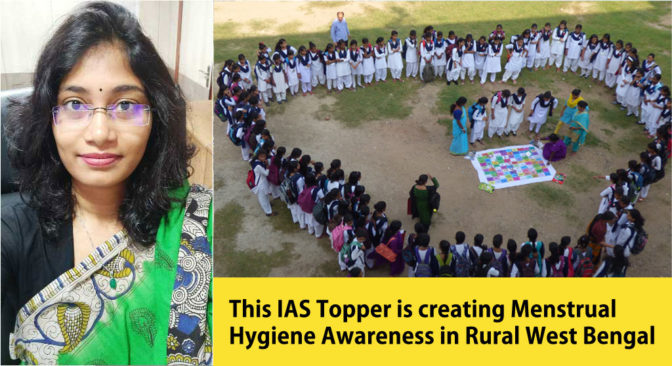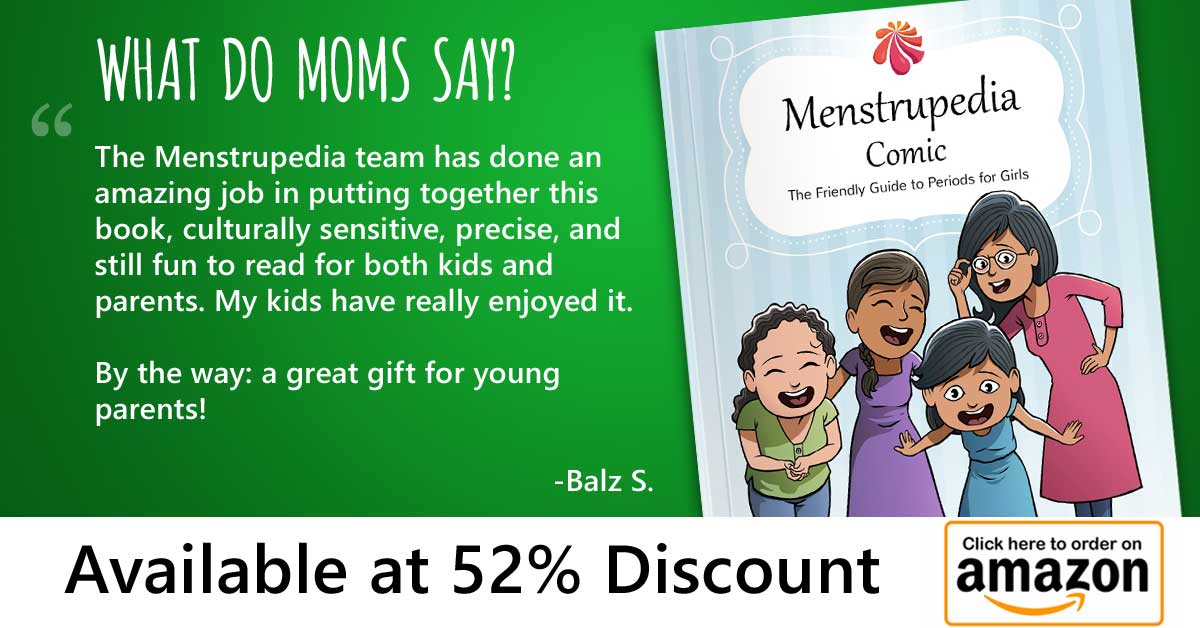Miss Lakshmi Bhavya Tanneeru, SDO at Arambagh in West Bengal, got in touch with Menstrupedia regarding her campaign LALANA. Through this campaign, she has been diligently working towards raising complete awareness around menstruation and menstruation hygiene management (MHM) in rural areas of West Bengal. We were delighted to see Menstrupedia Comic being used in LALANA workshops to teach thousands of girls and women about menstruation.
To get insights into how this initiative shaped up, we had a brief chat with Miss Bhavya Lakshmi. In conversation with Miss Lakshmi Bhavya…
1. Please tell us a little something about yourself
My name is Lakshmi Bhavya Tanneeru and I have done Btech in Electronics and Communications and MA in Public Management. I belong to the 2015 batch of the Indian Administrative Service (IAS). I’m currently posted as Sub Divisional Officer of Arambagh subdivision in Hooghly district of West Bengal.
2. What made you decide upon running an initiative like LALANA?
I started planning initially for a regular classroom menstruation hygiene awareness session for school going, adolescent girls. However, I realized it’s equally important to involve their mothers as well as they are the ones who have to support the schoolgirls at home. Gradually, it dawned upon us the importance to involve the boys too. During the extensive planning, I talked to various stakeholders like gynecologists, NGOs, and other organizations that work in Menstruation Hygiene Management (MHM). I realized there is an urgent need for a comprehensive program that deals with everything associated with MHM. Starting from basic knowledge sharing and awareness, to addressing the myths on this issue, exposure to various alternatives available for menstrual products, nutrition and hygiene, and sustainable and eco-friendly practices, we wanted to include everything in our initiative. That’s how LALANA was born, which means ‘woman’ in Bengali. It is a holistic menstruation hygiene awareness campaign.
3. Can you tell us more about the setup of LALANA? Any insights on how you went about conceptualizing it? Did you adopt certain techniques and advocacy to approach the problem?
I have conceptualized a 4 pronged strategy:
- To conduct menstrual hygiene awareness campaigns in schools and colleges for both girls and boys.
- To carry out menstrual hygiene awareness activities by ASHA and Anganwadi workers by involving women in that local community
- To open LALANA centers in the block rural hospitals manned by trained lady counselors (in Bengal, they are called Anvesha Counsellors) for adolescent girls/women to approach them freely without any hesitation or embarrassment regarding any menstruation-related problems, big or small. If it needs medical intervention, the counselor will accompany them to the specialist doctor,
- To involve Self Help Group (SHG) women in manufacturing cloth pads and marketing them as a sustainable alternative.
As on date, we have covered more than 3000 adolescent girls and established LALANA centers in all the 7 govt rural hospitals in this sub-division. We have trained more than 100 ASHA and Anganwadi workers as master trainers so that they can spread awareness door to door. We have also trained around 20 SHG women in making reusable and eco-friendly cloth pads. You can have a glimpse of the campaign in this video.
4. Were there any challenges you faced while implementing this LALANA campaign?
It was extremely difficult to coordinate with schools so that their regular school hours or examinations are not hindered. We have a target of 25,000 more adolescent girls to be covered in this sub-division for this year. Scaling up this initiative is another issue, as it requires financial resources as well as a self-sustainable set up that will continue for the years to come. Getting the stakeholders involved is also a herculean task as this is a sensitive and very personal issue for the majority. Also, manufacturing, maintaining quality standards, pricing, and marketing of cloth pads by SHG women have to be taken care of. It requires a small scale business model.
5. What are the changes you hope LALANA would bring in the lives of girls and women?
Basic awareness about the female reproductive system and its functioning would help them deal with their periods in a much better and convenient way. It will also help bust many myths and unhygienic practices surrounding menstruation. Also, many a time, adolescent girls or women feel shy to approach a male gynecologist, so the LALANA centers in rural hospitals will help address this issue. Exposure to alternative menstrual products other than disposable pads will empower them with a choice that suits their spending capacities. If they are equipped to deal with periods in a more comfortable way, it will lead to an increase in the school attendance, decrease in the drop out rate of adolescent girls, better health indicators and boost their self-esteem and confidence levels. I strongly believe it’s not just a few thousands of girls that we are educating, but an entire generation who would make their girl children embrace periods and maintain hygiene.
6. The best moment you would like to share, perhaps something that made you feel rewarded for the effort you put in?
Before the start of each and every awareness session, some of the girls and even the women giggle while some of them sit totally speechless as they consider talking about it as a taboo. But once we ease into the session after ice breaking, they open up gradually and ask so many questions. That exchange that happens gives me the ultimate satisfaction as they start to talk about it, show such a keen interest to know about menstruation and how to deal with it. At that moment, we experience a strong connection that is really personal. Age gap or job or economical status nothing comes into the picture, we are just a group of women who go through something similar in our lives.
7. Your message to our readers?
Menstruation hygiene is an important but often neglected component of public health in general. It has long term consequences on the health of women and hence the society. Creating awareness on this issue need not always be on a large scale. One can start with making their family and friends, their colleagues, their domestic help or other service providers at home and workplace aware of menstruation hygiene management. Making MHM a part of the curriculum in school education would benefit the adolescent girls and boys the most. Menstrupedia’s books are a very good way of reaching to girls in an entertaining and educating way as well. They are in the form of comics and available in regional languages as well which makes their reach wider.
Menstrupedia has also made Hello Periods, a free audio-visual resource that is being widely used to teach young girls about menstruation in a friendly way.
Interviewed and edited by: Menstrupedia Staff








